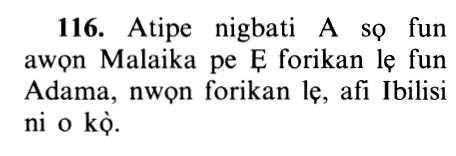20vs116
Select any filter and click on Go! to see results
وَإِذْ قُلْنَا لِلْمَلَائِكَةِ اسْجُدُوا لِآدَمَ فَسَجَدُوا إِلَّا إِبْلِيسَ أَبَى
Waith qulna lilmalaikati osjudoo liadama fasajadoo illa ibleesa aba
Index Terms
Click to play
Yoruba Translation

Hausa Translation
Kuma sa´ad da Muka ce wa malã´iku, "Ku yi sujada ga Ãdamu." Sai suka yi sujada, fãce Iblĩsa, yã ƙiya.
Asbabu n-Nuzuul (Occasions of Revelation)
Concerning Allah's statement,
وَإِذْ قُلْنَا لِلْمَلَائِكَةِ اسْجُدُوا لِآدَمَ ...
And when We said to the angels: "Prostrate yourselves to Adam.''
He, Allah mentions how Adam was honored and what respect was given to him. He mentions how He favored him over many of those whom He created.
A discussion of this story has already preceded in Surah Al-Baqarah, Surah Al-A`raf, Surah Al-Hijr and Surah Al-Kahf. It will also be mentioned again at the end of Surah Sad.
In this story, Allah mentions the creation of Adam and that He commanded the angels to prostrate to Adam as a sign of honor and respect. He also explains the enmity of Iblis for the Children of Adam and for their father, Adam, before them.
Due to this Allah says,
... فَسَجَدُوا إِلَّا إِبْلِيسَ أَبَى ﴿١١٦﴾
They prostrated themselves (all) except Iblis; he refused.
This means that he refrained from prostrating and became arrogant.
وقوله " وإذ قلنا للملائكة اسجدوا لآدم " يذكر تعالى تشريف آدم وتكريمه وما فضله به على كثير ممن خلق تفضيلا وقد تقدم الكلام على هذه القصة في سورة البقرة وفي الأعراف في الحجر والكهف وسيأتي في آخر سورة ص يذكر تعالى فيها خلق آدم وأمره الملائكة بالسجود له تشريفا وتكريما ويبين عداوة إبليس لبني آدم ولأبيهم قديما ولهذا قال تعالى " فسجدوا إلا إبليس أبى " أي امتنع واستكبر .
"و" اذكر "إذ قلنا للملائكة اسجدوا لآدم فسجدوا إلا إبليس" وهو أبو الجن كان يصحب الملائكة ويعبد الله معهم "أبى" عن السجود لآدم "قال أنا خير منه"
تقدم في ( البقرة ) مستوفى .
I'raab - grammatical analysis of the Qur'an
«وَإِذْ» الواو استئنافية إذ ظرف متعلق باذكر «قُلْنا» الجملة في محل جر مضاف إليه «لِلْمَلائِكَةِ» متعلقان بقلنا «اسْجُدُوا» أمر مبني على حذف النون والواو فاعل «لِآدَمَ» اللام حرف جر آدم مجرور بالفتحة نيابة عن الكسرة لأنه ممنوع من الصرف والجملة مقول القول «فَسَجَدُوا» الفاء عاطفة والجملة معطوفة «إِلَّا» أداة استثناء «إِبْلِيسَ» مستثنى بإلا منصوب بالفتحة «أَبى » ماض مبني على الفتح المقدر فاعله مستتر والجملة في محل نصب حال
